Over the years, the rules for statutory financing of the activities of the Polish Red Cross have changed, as has our role and position in the state.
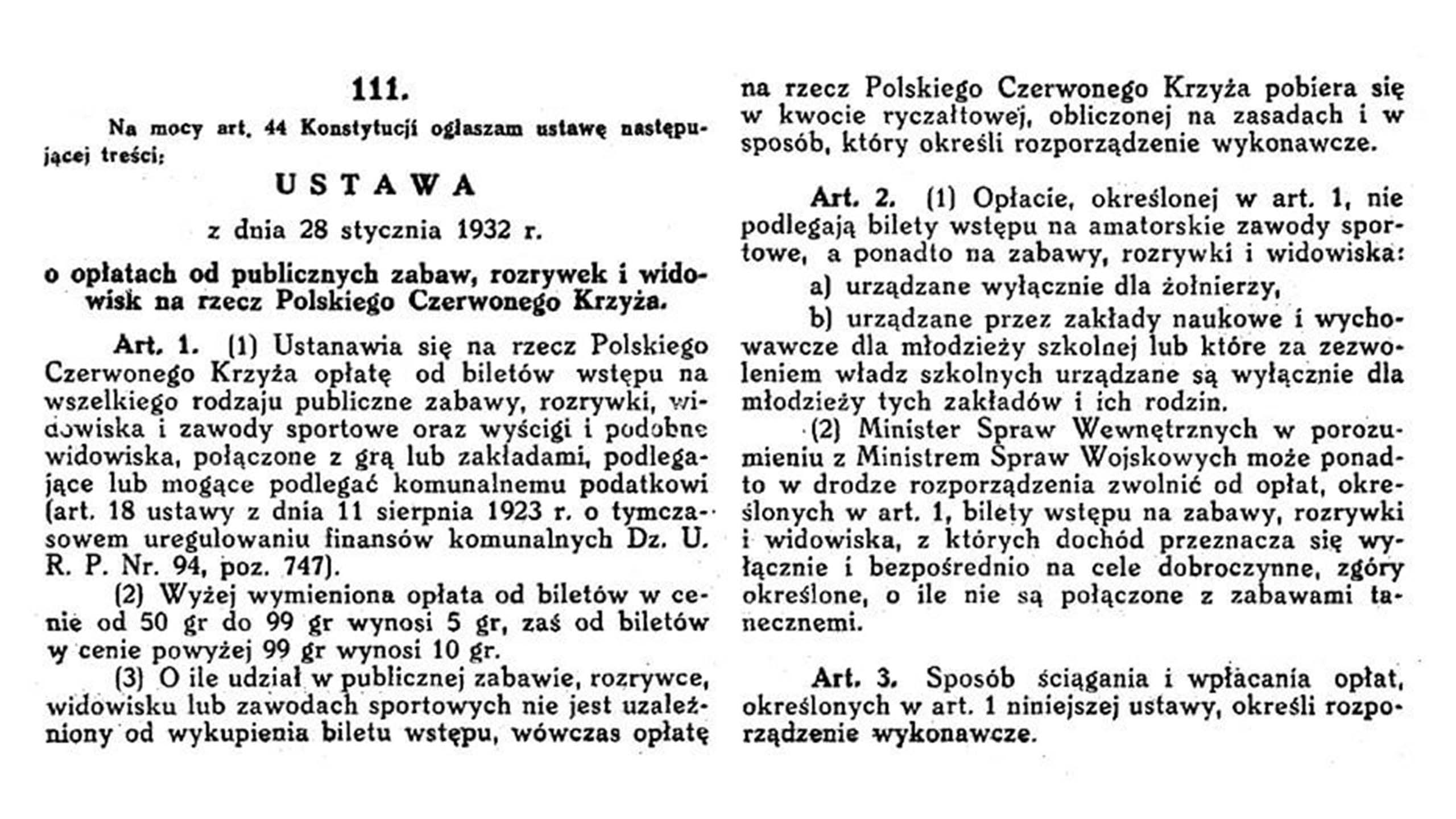
Fees from the sale of admission tickets.
In the interwar period, the Polish Red Cross held a privileged position in the state, benefiting from regulations of the act granting it donations from the sale of admission tickets to various performances, shows, concerts, spectacles, competitions, etc. Based on the act of January 28, 1932, on fees from public amusements and performances for the benefit of the Polish Red Cross, signed by President Ignacy Mościcki, a Regulation of the Minister of the Interior was issued, detailing the rules for paying fees to the Polish Red Cross. A fee was established for each ticket sold for theatrical, cinema, ballet, cabaret, concert, exhibition, circus performance, dance party, ball, folk party, sports competitions, and other so-called spectacles. The organizers of these events were required to collect additional fees, which they then paid into the municipal treasury. The municipalities transferred these revenues to the account of the Polish Red Cross twice a month. In this way, our organization had guaranteed permanent financial resources to conduct its statutory activities.
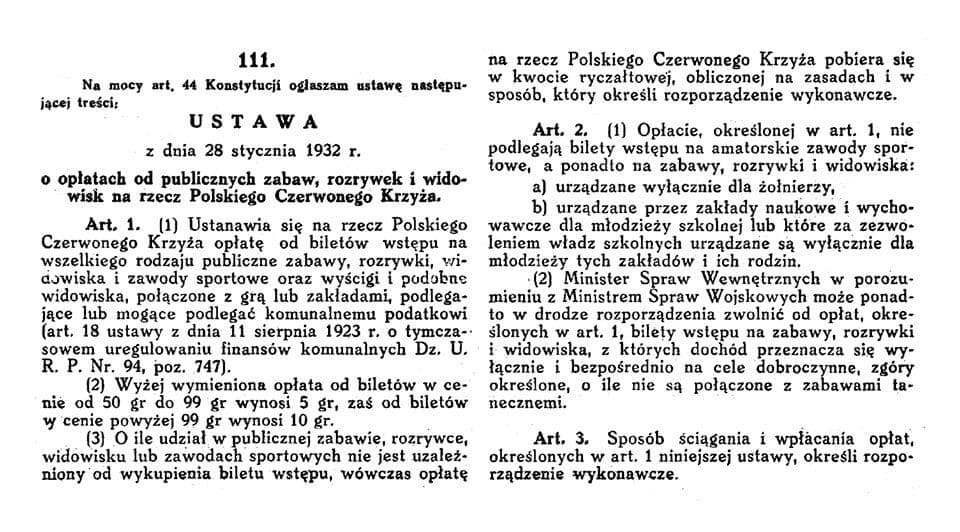
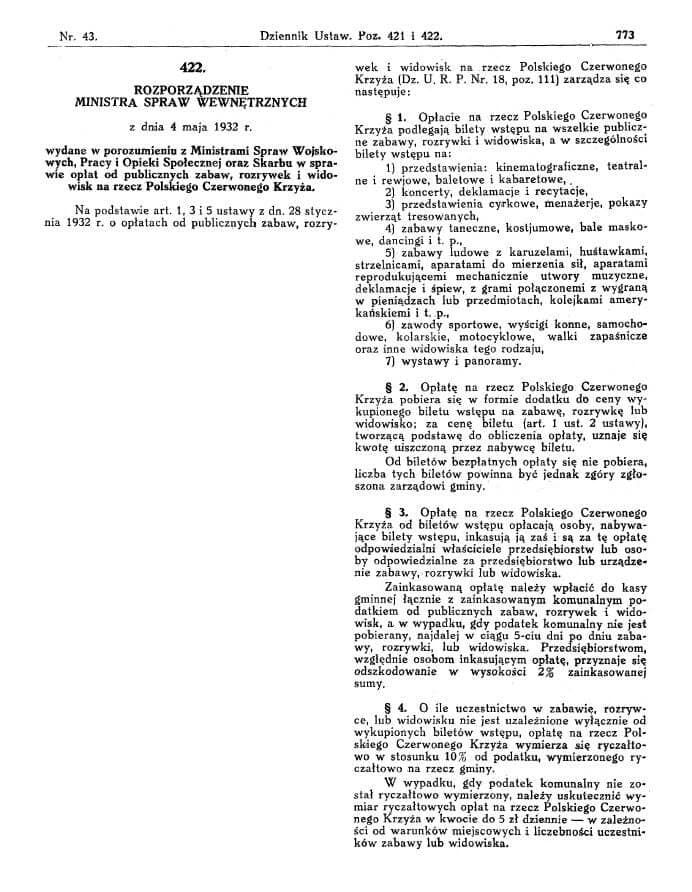
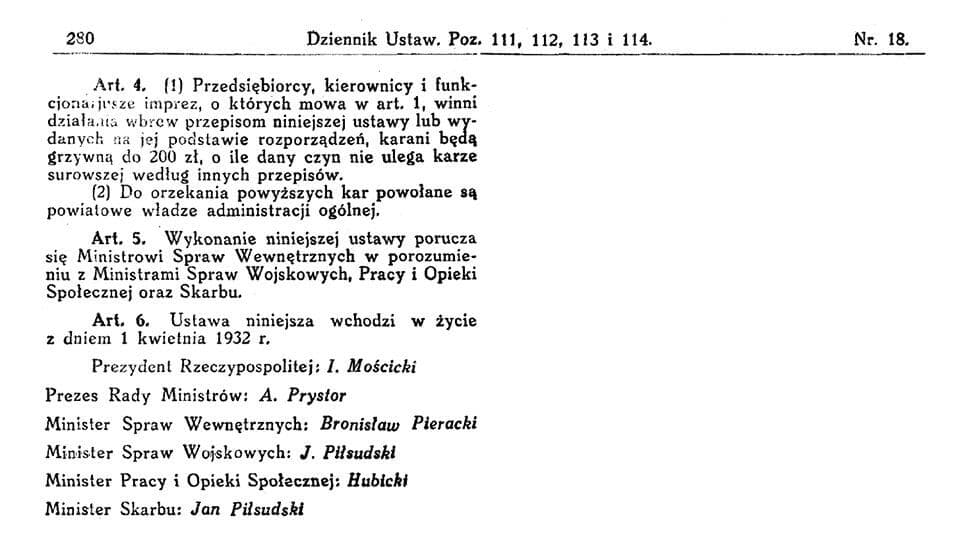
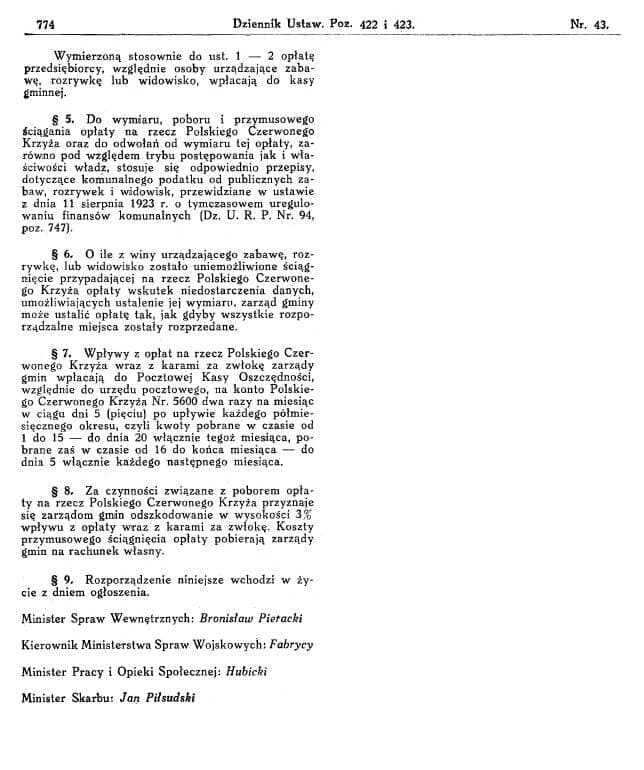




Court compensations.
In the post-World War II period, one of the sources of funding for social organizations, including the Polish Red Cross, became court compensations and monetary benefits awarded by courts in criminal proceedings against perpetrators of crimes. Compensation involved and still involves the obligation to pay a specified amount of money to the victim or another designated social purpose.
The possibility of the Polish Red Cross using funds from court compensations was created by the second Polish Penal Code of 1969. This code provided for mandatory compensation in case of conviction for hooliganism (Article 59 § 3) in the amount of 5000-50,000 PLN for the benefit of the Polish Red Cross or the victim or another social purpose. Optional compensation was also provided for defamation and slander (Article 178 § 3), which could also be awarded to the Polish Red Cross, the victim, or another social purpose.
The amendment to the code in 1985 expanded the range of situations in which compensation had to be awarded in amounts from 5000-50,000 PLN for social purposes related to health protection. These situations included conviction for intentional crimes against life and health or for other intentional crimes resulting in death; bodily injury or impairment of the health of the victim. The convicted person was to pay fees to the Polish Red Cross, the victim, or another social purpose. None of the compensations known to this code required a request from the victim and were determined ex officio, but in no case were they enforced ex officio and not subject to replacement by an alternative penalty. In case of its ruling, the court, without collecting fees, sent the enforcement title to the authorized entity for which the compensation was awarded. Under this code, it was the Polish Red Cross that was the main beneficiary of funds from court compensations, and the revenues from this title constituted significant amounts in the organization's budget.
The new Penal Code of June 6, 1997, introduced certain limitations and weakened the position of the Polish Red Cross. According to Article 47 §1–3 of the Penal Code, compensations could be awarded from perpetrators of crimes for social purposes related to health protection, environmental protection, and assistance to persons harmed in traffic accidents. Compensations could be granted to an institution, association, foundation, or social organization with national scope, listed in a special register maintained by the Minister of Justice. Therefore, both money from compensations and from monetary benefits were allocated by the court, choosing the entity that would receive them from a list of authorized "institutions, social organizations, foundations, and associations" maintained by the Ministry of Justice. Although the Polish Red Cross was listed among the privileged organizations, it was one of nearly 900 authorized entities.
In 2012, the existing Victim Assistance and Post-Penitentiary Assistance Fund was created. This is a targeted fund, managed by the Minister of Justice. One of the sources of funding for the fund is compensations and monetary benefits awarded by courts from perpetrators of crimes. These funds are distributed competitively among non-governmental organizations for assistance to victims and those leaving correctional institutions. The Polish Red Cross can, equally with other non-governmental organizations working for the above-mentioned individuals, apply for the allocation of these funds.
However, certain provisions remain in the Penal Code, albeit severely limited, concerning our organization. The Polish Red Cross was left with 2 types of compensations, although not exclusively:
• In the case of conviction for insulting another person using mass communication media, the court may adjudicate compensation for the benefit of the victim, the Polish Red Cross, or another social purpose indicated by the victim (Art. 216 of the Penal Code).
• In the case of conviction for slander, the court may adjudicate compensation for the benefit of the victim, the Polish Red Cross, or another social purpose indicated by the victim (Art. 212 of the Penal Code).

Along with the reduction of funds from compensations, a financial mechanism known as 1% was launched in Poland, which has been proven in other European countries. In 2003, with the adoption of the Act on Public Benefit Activity and Volunteering, a statutory possibility appeared for the Polish Red Cross and other non-governmental organizations to apply for public funds from a 1% income tax deduction from individuals. Non-governmental organizations, after meeting the conditions specified in the law, could obtain the status of a public benefit organization, allowing them to obtain these funds. The Polish Red Cross obtained the PBO status in 2005 and has since benefited from the rights related to the 1%.

The privileged position of our organization, statutory rights in obtaining funds for statutory activities essentially ended with the Second Republic of Poland. In the post-war period, the financial possibilities and the role of the organization gradually diminished. The Polish Red Cross ceased to be the only organization entitled to benefit from court compensations, and competition within the non-governmental sector grew with the emergence of new organizations. In 2011, before the fundamental reform of managing funds from court compensations, there were approximately 900 non-governmental organizations in the register of authorized entities maintained by the Minister of Justice, in addition to the Polish Red Cross, which together received about 30 million PLN from awarded compensations. Today, in the register of public benefit organizations entitled to receive 1% of taxes, there are over 8,200 PBOs that indeed receive over 660 million PLN collectively each year, nonetheless, the share of the Polish Red Cross in this global amount is small. Over the 100-year history of our organization, legal regulations, sources, and methods of financing activities have changed, and so has the role and standing of the Polish Red Cross.
Facts about the Polish Red Cross
Only after the fourth request to the International Red Cross was the Polish Red Cross recognized on the international stage.
The beginnings of blood donation in the Red Cross date back to 1935, which took place 83 years ago.
If the borders of Poland had not been changed after World War II, the 100th anniversary of the Polish Red Cross (PCK) would have been celebrated with the Lviv, Volhynian, and Wilno branches, which are still active today but under the structures of different state associations.
The employees of the Polish Red Cross carried out the exhumation of Polish officers murdered in the Katyn Forest while also being responsible for creating the official Katyn Lists
The Red Cross movement and its foundations were the source for the establishment of sanitary services for wounded soldiers under the names Polish White Cross and Polish Green Cross.
Over the years, the rules for statutory financing of the PCK's activities have changed, as has our role and position within the state.
The PCK enjoyed immense public trust during the Second Polish Republic, and the most important figures in the state always spoke about our organization with the utmost respect.
To this day, in Tarnów, Małopolska, there is a nearly 100-year tradition of parades through the city organized on the occasion of the Polish Red Cross Week.
On February 8, 2018, it was 50 years since the establishment of the badge of the Honorable Blood Donor
On February 8, 2018, it marked 50 years since the establishment of the badge of the Meritorious Honorary Blood Donor
PCK never accepted any gratifications and did not support the Nazi authorities, thereby exposing itself to severe consequences.
The Polish Red Cross was the initiator of healthcare in rural areas during the interwar period and the establishment of the first village health centers.
PCK was involved in the construction of the Marshal Piłsudski Mound in Sowińca in Krakow in 1936
At the beginning of 1919, within the structures of the newly established Polish Red Cross Society, 3 District Branches of the PTCK were created: for Galicia, the Grand Duchy of Posen, and Silesia.
During its 100-year activity, the Polish Red Cross, the International Committee of the Red Cross, honored 102 Polish nurses associated with our organization with the Florence Nightingale Medal.
The Polish Red Cross was the organizer of parachuting courses
Did two Polish doctors working at the Red Cross hospital during World War II save more lives than Oskar Schindler?
There existed simultaneously the Polish Red Cross and the Polish White Cross, whose president was Helena Paderewska.
There was a time in the history of PCK when, legally, two or even three Main Boards of PCK operated simultaneously.
Help us endlessly
Thanks to the kindness and support of our Donors, we can help children, seniors, support medical rescuers, promote the idea of blood donation, and implement many other projects that save lives in times of conflict or humanitarian crises. Every donation and every form of support is significant because the Polish Red Cross connects those in need with those who want to provide help. Let’s help together!
You are currently viewing a page filtered by content from the department. Cała PolskaIf you want to view content from Cała Polskaclick the button